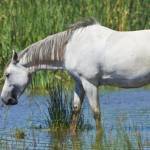Study: Horses Have Negative Effect on Water Quality

Horses are way cleaner than cows and pigs, right? And horse farms, especially small operations, can’t possibly impact the environment and water quality, right?
According to a recent study*, horses aren’t quite as perfect as some of us want to believe. Researchers found that horses do contribute heavily to “eutrophication,” negatively impacting water quality.
Eutrophication is the process by which a body of water becomes enriched in dissolved nutrients that stimulate the growth of plants and algae. Nitrogen, phosphorus, and carbon are common nutrients that contribute to eutrophication,” explains Kathleen Crandell, Ph.D., equine nutritionist at Kentucky Equine Research.
Excessive growth of plants and algae results in foul-smelling water with reduced clarity. Subsequently, the ability of predatory species to find their prey is reduced, and as the plants die en masse, they deplete oxygen and create “dead zones” in affected bodies of water.
Agriculture is believed to contribute a substantial proportion of nitrogen and phosphorus to water, but the specific contribution of horses to eutrophication remains poorly described. Current estimates indicate there are 9 million horses in the United States, 1 million in Great Britain, and about 0.5 million in each of Spain, Sweden, and Belgium. In all of those countries, most horse farms are located near towns and cities, home to vulnerable bodies of water used for human and animal consumption.
In a recent study, researchers focused on identifying hotspots for phosphorus, nitrogen, and carbon leaching from grazing, feeding, and excretion areas of horse paddocks. They found such areas are “substantial sources of water pollution.” They found the most leaching in feeding and excretion areas. Type of sand also impacts leaching (e.g., sandy soils has higher leaching than clay soils).
Proper manure management and avoidance of oversupplementation are two techniques currently suggested to help minimize leaching. Although those recommendations may seem like a “drop in the ocean,” any change is valuable because the runoff from the paddock of a single horse represents a significant potential load to receiving waters.
*Parvage, M.M., B. Ulén, and H. Kirchmann. 2014. Are horse paddocks threatening water quality through excess loading of nutrients? Journal of Environmental Management. In Press.








